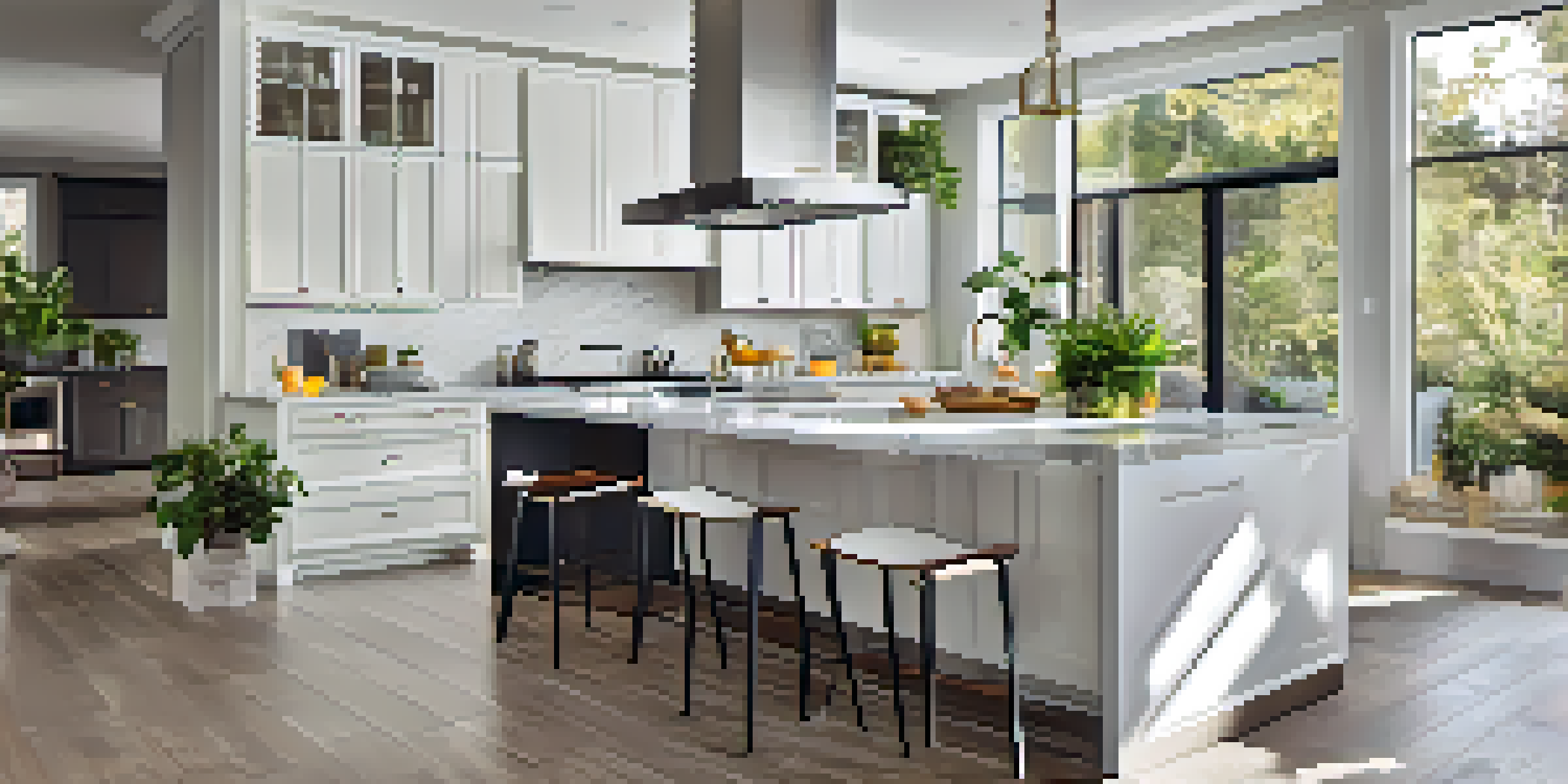How to Choose Renovations with the Best ROI Potential

Understanding ROI in Home Renovations
Return on investment (ROI) is a crucial metric when considering home renovations. It measures how much value a project adds compared to its cost. A high ROI means that you'll recoup a significant portion of your investment when selling your home.
Home improvement is a great way to increase the value of your home while making it more enjoyable to live in.
For example, if you spend $10,000 on a kitchen remodel that increases your home’s value by $15,000, your ROI would be 150%. This understanding helps you make informed decisions about which renovations to prioritize.
In essence, focusing on projects with the highest ROI ensures that your money works for you, transforming your living space while improving its market value.
Prioritize High-Impact Areas of Your Home
Certain areas of your home yield better returns than others. For instance, kitchen and bathroom renovations consistently rank among the top for ROI, as these spaces are highly scrutinized by potential buyers. A modern, functional kitchen can be a major selling point.

Think about it: a well-designed kitchen can make family gatherings more enjoyable and also becomes a focal point during home showings. Similarly, updated bathrooms add comfort and style, enhancing the overall appeal of your home.
Focus on High-ROI Renovations
Prioritizing renovations in key areas like kitchens and bathrooms can significantly boost your home's value.
By concentrating your efforts on these high-impact areas, you can significantly boost your home's value, making renovations a worthwhile investment.
Research Local Market Trends
Before diving into renovations, it's essential to research local market trends. Understanding what buyers in your area desire can guide your renovation choices. For example, if open-concept layouts are trending, consider removing non-load-bearing walls.
The best investment on Earth is earth.
Utilizing online tools and resources, such as real estate websites and local housing reports, can provide valuable insights into what features are in demand. Are outdoor spaces popular? Is energy efficiency a priority for buyers?
By aligning your renovations with local preferences, you increase the likelihood of attracting potential buyers and achieving a strong ROI.
Consider Energy-Efficient Upgrades
Energy-efficient upgrades not only reduce your utility bills but can also enhance your home’s marketability. Features like energy-efficient windows, insulation, and appliances appeal to environmentally conscious buyers. They often look for homes that help lower their carbon footprint.
For instance, installing solar panels might require a significant upfront investment, but they can also increase your home’s value and attract buyers who prioritize sustainability. Similarly, energy-efficient systems often qualify for tax credits, making them financially appealing.
Research Local Trends
Understanding local market preferences helps you make informed renovation choices that attract potential buyers.
Investing in energy efficiency is a win-win: you save money while potentially boosting your home's value in the long run.
Don't Overpersonalize Your Space
While it's tempting to create a home that reflects your unique style, overly personalized renovations can deter potential buyers. Remember, what appeals to you might not resonate with others. Striking a balance between personal taste and broader market appeal is key.
For example, bright purple walls or an extravagant custom bar might be your dream, but they could limit your home's attractiveness to future buyers. Neutral colors and classic designs generally have wider appeal, making it easier for others to envision themselves in your space.
By keeping renovations more universally appealing, you'll increase the chances of a higher ROI when it comes time to sell.
Get Professional Guidance When Needed
Sometimes, the best way to ensure a solid ROI is to consult with professionals. Real estate agents, interior designers, and contractors can provide insights tailored to your home and local market. They often have a wealth of experience to help you prioritize renovations effectively.
For instance, a real estate agent can tell you which projects are currently trending in your neighborhood. Meanwhile, a contractor can provide estimates and timelines to keep your project on track and within budget.
Budget Wisely for Renovations
Creating a well-planned budget ensures each renovation project enhances your home's value without overspending.
Investing in professional guidance can ultimately save you time and money while helping you make informed decisions that maximize your home’s value.
Budget Wisely for Maximum Impact
A well-planned budget is essential for achieving the best ROI from your renovations. It’s important to allocate funds wisely and keep track of all expenses. Overspending on a single project can jeopardize your overall investment strategy.
Consider creating a prioritized list of renovations based on their potential ROI and your budget. This way, if funds become limited, you can focus on the most impactful projects first, ensuring your home still receives valuable upgrades.

By budgeting effectively, you keep your renovation journey on track and ensure each dollar spent contributes to enhancing your home’s value.
Evaluate the Market Before Selling
Finally, take a moment to evaluate the market before selling your home. Understanding the current climate can help you determine the best time to list your property. If the market is hot, you might not need to invest as heavily in renovations to achieve a good sale price.
Conversely, in a slower market, it might be worth investing in additional renovations to make your home stand out. A well-timed renovation can directly influence your home's selling price and overall appeal.
By staying attuned to the market, you can make strategic decisions that maximize your investment and ensure a successful sale.